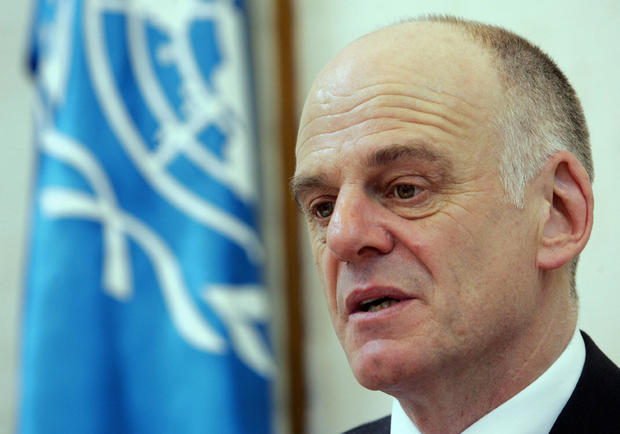World Health Organization’s coronavirus envoy, Dr. David Nabarro, has a message for President Trump
[ad_1]
The annual meeting of country members of the World Health Organization is being held this week in Geneva — but this year, the organization is facing unusual scrutiny. The U.S. has voiced harsh criticism and temporarily suspended funding to the organization pending a review, and the World Health Assembly has endorsed an investigation into how the WHO’s leadership managed the coronavirus pandemic. In a letter posted overnight on Twitter by President Trump, he threatened to permanently cut funding to the organization.
The WHO Director-General agreed to undertake an independent review. And adding to the level of U.S.- China tension, China’s President Xi Jinping announced on Monday that China would donate $2 billion toward the organization’s coronavirus response effort.
Dr. David Nabarro, a special envoy of the WHO Director General on COVID-19 and a medical doctor with a long history of battling global viruses, cautioned against conducting a “forensic examination” of the organization amid the pandemic in an interview with CBS News’ Pamela Falk.
“I’m pleading with people not to try to do a forensic examination right in the middle of a response,” he said, “because it’s like basically taking the fire engines away from the fire and asking it to go for routine maintenance when desperately needed to put out a flame.”
Getty
Read excerpts of Falk’s interview with Dr. Nabarro below.
Pamela Falk: How worried are you about a second wave of coronavirus, with countries opening up?
Dr. David Nabarro: I think more than a second wave, I’m worried about repeated new outbreaks. I want to differentiate this from a flu pandemic, which tends to come in waves. This is a completely new thing. It’s a coronavirus, a set of current virus outbreaks, and they come in little spikes that build up really fast, and I’m extremely worried that in the current lockdown situation, the viruses, all over the world, are in lots of different places.
[…] My worry is that there will be more outbreaks, and that we will find that for various reasons we don’t have the capacity everywhere to close outbreaks down, and it’s particularly difficult in overcrowded cities, it’s particularly difficult in very poor settings, it’s particularly difficult when a lot of refugees and others are gathered together in very difficult circumstances.
Goodness me, there are reasons to be worried.
The accusation by many countries, including President Trump in the United States, is that some of the decisions made were political — specifically, the issue with the [Chinese] Communist Party leadership failing to share research about human-to-human transmission, that it should have been sooner, and that they haven’t shared virus samples. To what extent is that legitimate?
Countries provide information to the WHO Secretariat. The WHO Secretariat is allowed to ask them for additional details, or to ask them to explain things, but there’s no compulsory powers, with the World Health Organization. It has to work with what it gets from countries.
So, if a country decides for some reason that they’re going to be slower than perhaps they might be to inform the World Health Organization that they’ve got a problem, due to a disease, the World Health Organization hasn’t gotten the power to go flying into that country and trying to find out more detail about what’s going on.
China still hasn’t shared the live virus samples, correct?
Well, actually I thought that… but as far as I’m concerned, every piece of material that was being required has been obtained, including the virus sequence which is the key thing, and samples have been shared.
I have not heard of any failure to share, because this has been really important, and as far as I know, everything that’s been requested by the WHO has been made available by the Chinese authorities. The issue that you’re referring to, which is in the resolution that’s being discussed right now, is ‘where did the virus come from?’
And there’s a request from governments who are meeting in this World Health Assembly, for a formal investigation to be done. Now we’d expect that. That’s normal. It’s part of learning the lessons, and there is a mechanism available.
The WHO is underfunded, you say?
Oh, terribly. And I think these questions that you’re asking, utterly legitimate questions that we really posed in this, as a result of this resolution.
But please, can we just not further burden the staff running the place with further having to do an inquiry now?
Let’s do it when the things have come down, say next year, but absolutely ask the question. … I’m pleading with people not to try to do a forensic examination right in the middle of a response because it’s like basically taking the fire engines away from the fire and asking it to go for routine maintenance when desperately needed to put out a flame.
President Trump suspended payments, was considering reinstatement, we’re back to he hasn’t made a decision yet. Do you have a message?
This organization is extraordinary. It focuses on the inequities, the inequalities in health between poor and rich like no one, no other body in the world.
It is the meeting place of all the people who are working on health, all over the world. It sets the standards on nutrition, on non-communicable diseases, on everything to do with environmental health, every area of health, the WHO sets the standards. It maintains the numbers, it tells us who’s dying of what, it sets up programs to improve malaria, children’s health, women’s health, road accidents, patient safety. You name it, they do it, because each year the bosses, the World Health Assembly gives them more work to do.
[…] Suddenly in the middle of this massive crisis, they get told that the major stakeholder thinks they’ve messed up and so he’s going to take the money away.
[…] So it’s kind of bizarre that suddenly this country that’s been really big in the WHO, has decided that it’s going to cut the budget, I don’t understand it. It just doesn’t make sense, doesn’t add up, right in the middle of something that’s affecting 7.8 billion people.
You know, it’s kind of, if you explained it to anybody else, especially given the support that’s always been there from the people, the people of the United States to WHO, they just couldn’t understand it. And sometimes it feels like a bad dream for staff inside the organization. They feel dumbfounded. They’re doing the best. They’re working with their Americans in there, many, many, many, and they’re doing such good work. They can’t understand it.
[ad_2]
Source link











